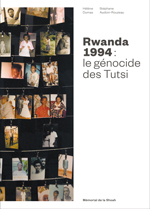Around the exhibition
For more than 10 years, the Shoah Memorial has been engaged in teaching the history of the three genocides of the XX
Publication
Booklet of the exhibition
projection - Sunday, May 18, 2014 > 11 AM
Kill them all! Rwanda, a story of a 'meaningless' genocide by Raphaël Glucksmann and David Hazan
[France, documentary, 97 min, Dum Dum Films, 2004]
April 1994, Rwanda falls into horror. For three months, the Hutu army, aided by militiamen and civilians, massacres nearly a million Tutsi. 10 years later, through interviews with key actors of this tragedy, the testimonies of survivors, and a historical perspective, this investigative documentary questions the failure of the international community to preserve peace.
In the presence of
> Free entry on reservation
projection - Sunday, May 18, 2014 > 2 PM
Kigali, images against a massacre by Jean-Christophe Klotz
[France, documentary, 94 mn, Sophie Dulac Distribution, 2006]
Kigali, capital of Rwanda, is delivered in May 1994 to the extremist Hutu militias as well as to the Rwandan army. The author, at the time a reporter cameraman, was hit by a bullet on his hip during an attack on a parish where there were about a hundred refugees. Ten years later, he returns to the scene to find the traces of possible survivors and his ephemeral "companions on the road". This film offers a reflection on the media and political treatment of these events.
In the presence of
> Free entry on reservation
projection - Sunday, May 18, 2014 > 5:30 PM
A few days in April (Sometimes in April) by Raoul Peck
[United States, France, fiction, 140 mn, Velvet Film, 2005]
Through the fate of two brothers with opposing choices, Honoré Butera, host at Radio Télévision Libre des Mille Collines, and Augustin Muzzy, engaged in the Rwandan army and married to a Tutsi, the drama is evoked in its daily reality and complexity. Between past and present, this film reveals the attitudes and circumstances that led the country on the path of intolerance, violence and mass murder.
In the presence of
> Free entry on reservation
projection - Thursday, May 22, 2014 > 6:30 PM
7 days in Kigali from Mehdi Ba and Jérémy Frey
[France, documentary, 52 min, Ladybirds Films, 2014, with the participation of France Télévisions]
Wednesday, April 6, 1994, a little before 8:30 PM, the Falcon 50 of President Juvenal Habyarimana is shot down by a missile while it begins its descent on the airport of Kigali. Immediately, the Rwandan capital flares up, the extermination of the Tutsi from Rwanda begins. They are farmers, teachers, humanitarian workers, diplomats, journalists, soldiers, militiamen... They are Rwandan, Belgian, French, Swiss, Senegalese... Everyone is in Kigali this Wednesday, April 6, 1994, a little before 8:30 PM.
In the presence of the directors
> Free entry on reservation
projection - Thursday 22 May 2014 > 8 PM
Homeland by Jacqueline Kalimunda
[France, documentary, 90 min, Émile Furieux Productions / Simba Productions, 2006, vostf]
Homeland is the journey of a woman who questions her land, her people and history through two generations, in an attempt to grasp genocide, the notion of ethnic difference and the recurrence of violence. Enriched with numerous unpublished archives, this documentary gives a central place to testimonies.
In the presence of
> Free entry on reservation
projection - Thursday, June 5, 2014 > 6:30 PM
Rwanda, a cry of incredible silence by Anne Lainé
[France, documentary, 52 min, Palindromes & Little Bear Productions, 2003]
This documentary makes heard a cry that only echoed the incredible silence of the international community. Carried out 9 years after the genocide of the Tutsi, it testifies to the difficult psychic reconstruction of the survivors. It gives voice to survivors, psychiatrists and members of self-help associations. These testimonies, hesitant and modest, interspersed with long silences, tell more about the genocide in Rwanda than grand speeches or streams of atrocious images.
In the presence of
> Free entry on reservation
projection - Thursday, June 5, 2014 > 8 PM
My neighbor, my killer of Anne Aghion
[France, USA, documentary, 90 min, Gacaca Productions, 2008]
After the genocide of the Tutsi, in 2001 the government set up Gacaca, open-air popular courts intended to promote reconciliation. On the one hand, tens of thousands of killers are encouraged to confess their crimes in order to return to live at home, on the other hand, their former Tutsi neighbors, traumatized survivors, are invited to forgive them. Anne Aghion filmed the community of a small rural village for ten years, and traced the impact of these Gacaca on survivors and criminals.
In the presence of
> Free entry on reservation
conference - Sunday, May 25, 2014 > 9am
Rwanda: April 1994. The great witnesses
> See the programme
> Free entry on reservation
testimonies - Sunday 1
The word of the survivors
The words of the survivors, on the painful path of the narrative of memory, make the link between the quest for knowledge, the tribute to the victims and the courage of the survivors. Introduction Alain Ngirinshuti, survivor, vice-president of
Hosted by
Follow-ups of the projection of Itangaza
[France, documentary, 35 min, Giraf Prod, Rwanda avenir, 2013]
In 1994, the genocide perpetrated against the Tutsi caused nearly one million deaths in Rwanda. 125 widows survivors and their children live in a group housing estate, in an outlying neighborhood of the capital. To accompany them in a process of self-reconstruction, the
In the presence of
> Free entry on reservation
testimonies - Sunday 1
The word of the survivors
The words of the survivors, on the painful path of the narrative of memory, make the link between the quest for knowledge, the tribute to the victims and the courage of the survivors.
Interviews
Hosted by
Interviews
Twenty years after the genocide against the Tutsi in Rwanda, a survivor testifies, (ed. Les Belles Lettres), 2014,
Hosted by
> Free entry on reservation
In partnership with